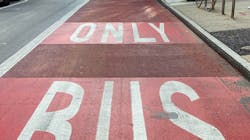SEPTA piloting camera-assisted bus lane enforcement technology
The Southeastern Pennsylvania Transportation Authority (SEPTA) launched a pilot program in April aimed at identifying trouble spots where vehicles are parked illegally in bus lanes and at transit stops. These vehicles contribute to increased boarding and alighting time for passengers on bus and trolleys. SEPTA reports its average bus speeds in Philadelphia is 8 mph, which is slower than the national average of 13-14 mph.
On April 20, SEPTA, partnering with Hayden AI, launched a pilot on Bus Routes 21 and 42 that utilizes camera-assisted bus land and stop technology to detect illegally parked vehicles. The camera system is mounted inside buses and will automatically detect illegally parked vehicles on the Chestnut Street and Walnut Street bus lanes and at bus stops. SEPTA will not be issuing tickets during the pilot, but the information gained will illustrate the scope of the illegal parking problem impacting transit.
Slower bus speeds do not only add to travel time but have considerable impact on operating expenses. SEPTA says congestion in Center City causes 1.7 million hours of passenger delay and adds $15.4 million to the authority’s operating costs.
“SEPTA is excited to explore how new technologies can help improve safety on the system, as well as the overall customer experience,” said SEPTA General Manager and CEO Leslie S. Richards. “This pilot program will help us better identify areas where we are seeing bus lane violations and look at possible solutions, particularly as we move forward with Bus Revolution.”
The 60-day pilot with Hayden AI will not have a cost for SEPTA but is expected to improve transit reliability, trip times and safety and promote safe and accessible boarding by addressing illegal parking in bus lanes and at stops. SEPTA reports buses equipped with the technology have recorded on average more than 4,000 incidences of parking in bus lanes or bus stops per week.
While the system is being piloted on SEPTA, Hayden AI’s technology has been used on Metropolitan Transportation Authority (MTA) in the New York City region to enforce bus lane violations through a contract to install its system on as many as 500 MTA buses. Hayden AI says the technology, coupled with ticketing enforcement, has significantly increased compliance with bus lane stopping and parking restrictions.
“Bus service should be rapid, accessible and safe to board, but illegal parking in dedicated transit zones makes this impossible,” said Chris Carson, CEO and co-founder of Hayden AI. “We’ve seen our technology help keep bus lanes clear for buses in New York and are excited to assist SEPTA with this technology pilot in Philadelphia.”
About the Author

Mischa Wanek-Libman
Group Editorial Director
Mischa Wanek-Libman is director of communications with Transdev North America. She has more than 20 years of experience working in the transportation industry covering construction projects, engineering challenges, transit and rail operations and best practices.
Wanek-Libman has held top editorial positions at freight rail and public transportation business-to-business publications including as editor-in-chief and editorial director of Mass Transit from 2018-2024. She has been recognized for editorial excellence through her individual work, as well as for collaborative content.
She is an active member of the American Public Transportation Association's Marketing and Communications Committee and served 14 years as a Board Observer on the National Railroad Construction and Maintenance Association (NRC) Board of Directors.
She is a graduate of Drake University in Des Moines, Iowa, where she earned a Bachelor of Arts degree in Journalism and Mass Communication.
